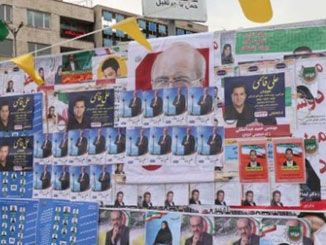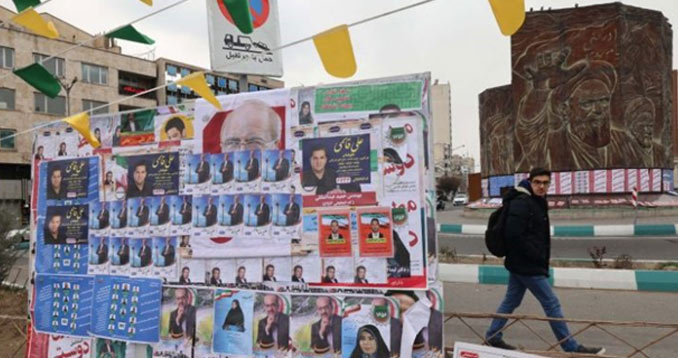

Hasht-E Subh The elections for the Assembly of Experts and the Islamic Consultative Assembly (Parliament) of Iran were held on Friday. However, these elections have repercussions for the region, including the situation in Afghanistan. Before delving into the implications, it is necessary to provide an overview of the current state of these elections.
The successful conduct of the elections for the Assembly of Experts and the Islamic Consultative Assembly posed a significant challenge for the Iranian government, one it struggled to overcome. This challenge stemmed from the low voter turnout. Before the elections, Iranian citizens protested by issuing calls and launching campaigns urging people not to participate.
They believe that these elections are engineered by the Revolutionary Guards and the “Office of the Supreme Leader.” On the other hand, the primary demand of opponents and critics of the Islamic Republic system in Iran is its overthrow. Therefore, any mechanism that aids this system or contributes to its legitimacy faces opposition from critics. The successful holding of these elections was expected to require at least 50% participation of eligible voters. However, when the Iranian Ministry of Interior announced the turnout for Friday’s elections, it was reported as 41%. The low turnout of voters dealt a further blow to the authority of the Islamic Republic, which has recently been severely damaged. Critics of the Islamic Republic label this 41% as fabricated and fraudulent statistics, alleging that the government intends to use it to obscure the true extent of the decline in participation. Nevertheless, even if this 41% figure is accurate, the Iranian government still failed to emerge victorious in this tough battle against opponents and boycotters. According to reports, these elections were the coldest and least vibrant in the history of the Islamic Republic of Iran, with a decrease in the number of participants compared to previous elections.
Another challenge in the Friday elections is the presence of void and blank votes. In some provinces and cities, the total number of void votes is almost equal to the votes received by the leading candidate in that district/province. This challenge has persisted in the two previous elections (the 2018 parliamentary elections and the 2021 presidential elections) as well.
It seems that the Guardian Council, which reviews the qualifications of election candidates, has played a significant role in what is perceived as election engineering. The Guardian Council acts as a filter, disqualifying candidates opposed to the system and identifying “undesirable elements.” Individuals whose candidacy qualifications are rejected by this council lose their right to run for office. In the past, this council has taken serious action against those perceived as system opponents and did not confirm their qualifications. Those associated with the so-called “reformist” movement had their qualifications confirmed. Now, prominent figures of this movement, such as Hassan Rouhani, the former President of Iran, have also been disqualified by this council. Reformists, who were once the hope of the majority of the Iranian people, are now marginalized both by the conservatives and by the Iranian people themselves.
Conservatives see them as their rivals, and the people no longer consider “system reform” as a viable option; they do not think of anything less than the overthrow of the Islamic Republic. Of course, some people still support the Islamic Republic regime and participate in elections, standing behind the policies of Ali Khamenei, the religious leader of the Islamic Republic.
Critics argue that this time the government has engineered the elections in a way that consolidates power completely within key institutions. The religious leader of Iran and the Revolutionary Guards, who are the main decision-makers, form the core of the conservative movement. Mr. Seyed Ebrahim Raisi, a prominent figure in the conservative movement, also manages the presidency. The Guardian Council and the legislative branch have also fallen into the hands of this movement. Therefore, the government and the power institutions in Iran are now unified. The question now arises as to why these elections and their outcome affect the region.
The consolidation of power in Iran will impact the internal situation of the country. Domestically, it will intensify opposition and lengthen the ranks of those calling for the overthrow of the Islamic Republic. On the other hand, it will provide more opportunities for intervention in the affairs of other countries, which will contribute to tensions in other countries.
With power institutions in Iran now consolidated and fully controlled by conservatives, the likelihood of increased tension in the region exists. Iranian conservatives still believe in “exporting the revolution” and occasionally speak about it. The essence of exporting the revolution is interfering in the internal affairs of other countries. This interference often involves training proxy forces and using them against national governments. The Islamic Republic of Iran has decades of experience in this regard.
Iranian conservatives have a good rapport with extremist groups in the region. The conservative movement has a quasi-Taliban mindset, which does not feel comfortable with its secular forces. Currently, the Iranian government has very friendly relations with the Taliban and the Al-Qaeda network, even appearing as their spokesperson and lobbyist. In places where the Taliban cannot operate, the Iranian government unofficially represents them.
When the UN Security Council passed a resolution tasking the Secretary-General of the UN to appoint a special representative for Afghanistan, Iran was among the first opponents. Even the Taliban opposed Iran’s move to appoint a special representative. Consolidation of power in Iran means the enduring friendship of the Islamic Republic with the Taliban. This friendship aids the Taliban, to the detriment of the people of Afghanistan. Strengthening the Taliban means more suffering for the people of Afghanistan and more killings and executions in this country.
On the domestic front, the engineering of these elections has led to events whose smoke reaches the eyes of the people of Iran and then the people of the region, including Afghan workers. The saga of elections and the Islamicization of democracy in Iran has reached a point where even critics of the regime no longer believe in reforming it. Even the so-called reformist movement has become disillusioned with reforming the system to the extent that it did not contest or compete for the presidency in 2021. Even when a reformist was president, there was not enough power to enact reforms. Since this regime faces severe criticism from a significant portion of the Iranian people, it probably increases dissatisfaction. The consolidation of power and the dominance of conservatives over all affairs accelerate the trend of increasing opposition to this system. While opponents and critics of the regime no longer believe in or hope for its reform, they will likely double their efforts to overthrow it. These efforts imply turmoil, in which Afghan residents in Iran, including workers, are severely affected. Their families in Afghanistan also lose their sources of income, albeit limited. Although a large amount of money does not flow from Iran to Afghanistan, many families secure their food and other necessities through work in Iran. Turmoil in Iran temporarily deprives Afghan workers of job opportunities and exacerbates poverty on this side of the border. The hardening of the Iranian government intensifies regional tensions and strengthens groups like the Taliban.
